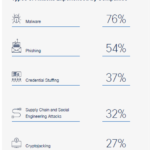Harry Wilson is the Head of Digital Marketing Department at Globex Outreach.
He helps clients grow their online businesses and occasionally writes blogs to share his experience with other professionals. This is Harry’s first contribution to 21st Century Tech Blog and the topic is one that anyone starting a new Internet-based business or one with an online presence needs to know. Cybercriminals and hackers are abundant on today’s World Wide Web. They are one email or one inadvertent click away from gaining access to personal and customer data. Knowing what a business might face and how to secure it, therefore, is a must. If you have never read about cybersecurity, consider this posting to be a good introduction with links to help you learn more.
The FBI’s Internet Crime Report stated that cybercrime losses exceeded US $4.2 billion in 2020. And out of these, new business firms proved to be more vulnerable to cyberattacks. Why new businesses? Because small and new businesses are tempting targets to cybercriminals because they have the information that fraudsters seek, and lack the cybersecurity that larger, more established companies implement. Moreover, many new business organizations can’t afford IT specialists and solutions, don’t have the time to commit to cyber protection or know where to start.
What Is Cybersecurity?
Cybersecurity is the condition or process of preventing and recovering from cyber attacks on computer systems, networks, devices, and applications. Hackers employ new artificial intelligence (AI) and social engineering methods to evade conventional data security protections. As a result, cyber assaults are becoming a more sophisticated and evolved risk to vulnerable data.
The cyberworld is constantly evolving, depending more and more on newer technologies. This trend will grow as we bring the next generation of advanced technologies, with accessibility to our linked devices via WiFi and Bluetooth.
Intelligent cloud security measures, therefore, need to be deployed to prevent unwanted access. And the promotion and usage of strong passwords to safeguard customer data needs to be at front of mind when integrating new software and systems.
Why Is Cybersecurity Important?
Cybersecurity is essential to protect a business against theft and loss of all types of data. So much sensitive information, protected health and personal information, intellectual property, operational, government and industrial data are all vital and valuable to a company’s reputation and its operational viability. Without cybersecurity programs, therefore, a business leaves itself open to data breaches that can freeze operations and cost a lot of money. That’s why a new business needs to choose strong cybersecurity and should embrace technology that intervenes to prevent approaching attacks.
What Are the Most Common Threats?
Although cyberattacks constantly change, company owners need to be aware of what are their most typical forms which include:
- Malware is a blanket term for software specifically meant to harm computers, servers, customers, or network devices.
- Ransomware is software that infects a computer and prevents access until a ransom is paid. Ransomware is frequently spread via phishing emails and makes use of software flaws that have been left unattended.
- Phishing is a form of cyberattack that infects a computer with malware or collects sensitive information through the sending of an email or going to a website containing embedded malware. Phishing emails may appear to come from legitimate companies or acquaintances. In many cases, the receiver of a phishing expedition gets fooled into clicking a link or attachment containing malware.
What Are the Implications of Cybercrime?
Ignoring the issue of cybersecurity may affect a business in several ways, including having:
- Financial Impact: Intellectual property data theft, firm information espionage, trading interruptions, and the expense to repair a corrupted system all become an extra burden.
- Reputational Cost: Consumer trust gets eroded, present and potential consumers get lost to rivals, and negative media coverage gets generated.
- Regulatory Cost: Because of general data protection regulations (GDPR) and other data breach rules, a company might face regulatory penalties or punishment due to cybercrime.
To learn more visit cybersecurity online course sites like this one offered by Harvard University so that you can go from being a novice to becoming well-informed and ready to face and deter cybercriminals.
















